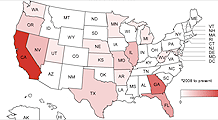No bankruptcy help for homeowners
Measure to modify delinquent loans in bankruptcy court fails in Senate. Obama administration loses big stick to prod loan servicers to aid troubled borrowers.
NEW YORK (CNNMoney.com) -- The Obama administration lost a bid to add a powerful weapon in its fight against foreclosure Thursday, after the Senate voted down a proposal to allow bankruptcy judges to modify mortgages.
The defeat left many housing advocates questioning the effectiveness of the president's loan modification plan. The so-called cramdown provision, which would allow judges to reduce mortgage principal, would have put pressure on servicers to modify loans before borrowers file for bankruptcy.
The financial industry lobbied hard against the bill, arguing that letting judges change mortgage contracts would add instability to the market and raise interest rates. Senate Republicans and some moderate Democrats were concerned about the bill's impact and about the growing resentment among homeowners in good standing.
The bill was defeated by a 51-45 vote. The House had passed similar legislation last month.
The vote comes on the day that a new report showed foreclosure starts spiking to a record high in March. Servicers initiated foreclosure proceedings against 290,000 borrowers, according to Hope Now, a coalition of lenders, servicers, investors and housing counselors. That's the highest monthly total since the group began tracking data in mid-2007.
In offering the bill, Sen. Richard Durbin, R-Ill., cited Moody's statistics showing that 8.1 million borrowers are facing foreclosure. The bankruptcy provision could prevent up to 1.7 million of them, he said.
Bankruptcy reform was a key part of Obama's foreclosure prevention plan, which was introduced in mid-February. It aims to encourage servicers to be more aggressive in modifying loans through a mix of carrots, in the form of incentive payments, and the stick of cramdowns. Servicers have come under fire for not helping enough homeowners through voluntary initiatives.
Now, it remains to be seen how many people will get relief, experts said.
"It won't render the loan modification program useless, but it removed an important ingredient that would have helped realign everybody's interests," Barry Zigas, director of housing policy for the Consumer Federation of America, said of the measure's defeat.
Servicers covering 75% of the nation's mortgages are now participating in the modification program, which calls for banks to lower troubled borrowers' monthly payments to 31% of their pre-tax income. Many major servicers said they have beefed up their loan workout departments to handle more calls.
However, most just started accepting applications, so experts say they won't be able to judge the program until the fall at the earliest. By then, hundreds of thousands of borrowers could lose their homes.
"If it's not working, it's kind of too late then," said Adam Levitin, an associate law professor at Georgetown University. Cramdown was designed as "a backstop to protect homeowners if modifications didn't work. It's supposed to be a safety net to catch homeowners."
The cramdown measure also addressed a major hole in the Obama plan -- helping homeowners who owe far more than their homes are worth. Bankruptcy judges could address this problem by reducing the principal balance on the home, said Bruce Dorpalen, director of housing counseling for Acorn Housing.
Servicers, however, have been ramping up their modification efforts in recent months. About 134,000 mortgages were adjusted in March, nearly 20,000 more than the average since September, according to Hope Now.
Housing counselors acknowledge that servicers have been more willing to do modify loans by reducing interest rates. The Obama program's incentives -- servicers get $1,000 for each modified loan and more if the borrower doesn't redefault -- will likely encourage bankers to do even more.
"The program will be very effective at keeping people in their homes," said Scott Talbott, senior vice president of government affairs at the Financial Services Roundtable, a lobbying group. "Their efforts are reaping huge rewards for people." ![]()


